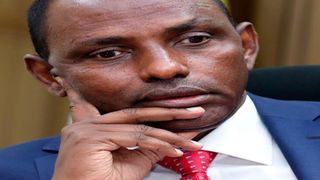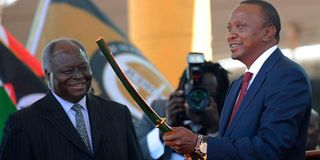
Treasury Cabinet Secretary Ukur Yatani.
| File | Nation Media GroupNews
Premium
IMF comeback signals tough times ahead
What you need to know:
- Past structural reforms had mixed results, having been blamed for pushing many into destitution.
- President Mwai Kibaki's administration ensured Bretton Woods institutions were locked out of Kenya’s fiscal policy.
Brace for higher taxes, job cuts and tough economic times ahead, the IMF is back.
The International Monetary Fund (IMF) on Monday announced a Sh264 billion (USD2.4 billion) loan to Kenya, and with it a raft of new conditions whose effects are set to permeate through the entire economy.
A decade after the Mwai Kibaki administration firmly shut out the Bretton Woods institutions — World Bank and the IMF — the two are back at the centre of Kenya’s economic policy making table.
The first condition that the IMF has attached to its big loan is that Kenya must start living within its means. This means freezing growth of the national budget, whose annual expansion has contributed to heavy borrowing to plug revenue deficit.

Former President Mwai Kibaki (left) hands over the presidency to Mr Uhuru Kenyatta on April 9, 2013. A decade after the Mwai Kibaki administration firmly shut out the Bretton Woods institutions — World Bank and the IMF — the two are back at the centre of Kenya’s economic policy making table.
The second condition is that Kenya must restructure or privatise parastatals that continue to bleed the taxpayer — a demand that has in the past come with thousands of job losses.
Raise taxes
Most importantly, and in a signal of tough economic times ahead, the IMF wants the Treasury to wean itself of its borrowing appetite and instead find alternative ways of raising more money through taxes.
The Washington DC-based lender, in the statement released on Monday, said its team of technocrats and the Kenyan government had reached a staff-level agreement on a 38-month programme “to help the next phase of the country's Covid-19 response and a strong multi-year effort to stabilise and begin reducing debt levels relative to GDP.”
"The authorities' programme aims at reducing debt vulnerabilities through a multi-year fiscal consolidation effort, centred on raising tax revenues and tight control of spending, which would safeguard resources to protect vulnerable groups," stated the IMF.
Anti-corruption measures
The lender also said structural and governance reforms are in the offing, to address weaknesses in some parastatals and strengthen transparency and accountability by implementing anti-corruption measures.
Past IMF structural reforms had mixed results, and are blamed for having pushed many public servants into joblessness with little to show in terms of savings.
Kenyans also started paying for health in public hospitals and fees in public schools as part of the infamous cost-sharing experiments that pushed many into destitution.
President Kibaki weaned the country off the dependence on debt, which saw his government stop IMF’s tinkering in the country’s economic policy.
Kibaki-era gains getting lost
But these gains appear to be getting lost, with the Treasury having piled up huge budget loans in the past eight years of the current Jubilee administration and now desperately in need of help.
An IMF team led by Mary Goodman conducted virtual missions to Kenya from December 9 to 17, 2020 and from February 4 to 15, 2021 to undertake negotiations on the programme under the Extended Fund Facility (EFF) and Extended Credit Facility (ECF) arrangements.
"The staff-level agreement is subject to IMF management approval and executive board consideration, which is expected in the coming weeks," Ms Goodman said.
IMF said the programme would also strengthen the monetary policy framework and support financial stability.
"Building on steps the authorities have already taken, the strong multi-year consolidation effort will deliver a primary balance that would stabilise debt as a share of GDP and put it firmly on a downward path over the course of the programme," the statement added.
It said this would free up resources for private investment, setting a strong footing for durable growth coming out of this global shock.
"The programme will also form a strong basis for support from other development partners," it added.
Covid-19 shock
The plan incorporates flexibility by recognising near-term uncertainties about tax yields due to challenges from the Covid-19 shock in key sectors like hospitality.
Parastatals should expect new reforms in the coming years if the plan is fully implemented.
The IMF notes that as Kenya evaluates risks in the State-owned enterprises, the programme will support plans over time to develop a strategy to address weaknesses in vulnerable parastatals within the scope of the limited available fiscal space.
It notes that the Kenyan government has already begun reversing some of the earlier extraordinary measures introduced at the outset of the shock, while maintaining others.
"Building on the steps already taken, the programme would support the authorities' efforts and provide resources to protect vulnerable groups," the lender said in its Monday brief.
"The programme will support the next phase of the country's Covid-19 response and the authorities' plans for a strong multi-year effort to stabilise and begin reducing debt levels relative to GDP, laying the ground for durable and inclusive growth over the years to come," Goodman added.
Kenya’s economy was hard hit at the onset of the Covid-19 crisis, but growth has been recovering since mid-last year.
The lender says Kenya's forceful early actions cushioned the pandemic's economic impact, and real GDP growth is projected to have contracted by just negative 0.1 percent in 2020.
Inflation remained within the Central Bank's target band, reaching 5.7 percent in January, while financial sector vulnerabilities have been contained and the banking system remains well capitalised.
"The external sector proved resilient against the backdrop of the shock, with horticultural exports and remittances performing well," the lender said.

President Uhuru Kenyatta with IMF Managing Director Kristalina Georgieva at State House, Nairobi.
Containment measures
The reopening of schools and removal of pandemic containment measures are expected to underpin a growth rebound to 7.6 per cent in 2021, even as some sectors of the economy face continuing headwinds.
"With the pickup in activity, the earlier temporary personal and corporate income tax cuts as well as the reduced VAT rate were discontinued at end-December, shoring up tax revenues."
Overall, the authorities' decision to pause fiscal adjustment this year will allow accommodating health, social, and development spending to support the recovery, complemented by accommodative monetary policy.
The IMF team met with Treasury Cabinet Secretary Ukur Yatani; Central Bank of Kenya (CBK) Governor Patrick Njoroge, Head of the Public Service Joseph Kinyua, the Treasury Principal Secretary Julius Muia, CBK Deputy Governor Sheila M'Mbijjewe and other senior government officials.





